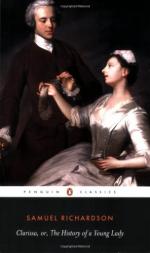Besides what has been said above, and in the Preface, on this head, the following opinion of an ingenious and candid foreigner, on this manner of writing, may not be improperly inserted here.
’The method which the author had pursued in the History of Clarissa, is the same as in the Life of Pamela: both are related in familiar letters by the parties themselves, at the very time in which the events happened: and this method has given the author great advantages, which he could not have drawn from any other species of narration. The minute particulars of events, the sentiments and conversation of the parties, are, upon this plan, exhibited with all the warmth and spirit that the passion supposed to be predominant at the very time could produce, and with all the distinguishing characteristics which memory can supply in a history of recent transactions.
’Romances in general, and Marivaux’s amongst others, are wholly improbable; because they suppose the History to be written after the series of events is closed by the catastrophe: a circumstance which implies a strength of memory beyond all example and probability in the persons concerned, enabling them, at the distance of several years, to relate all the particulars of a transient conversation: or rather, it implies a yet more improbable confidence and familiarity between all these persons and the author.
’There is, however, one difficulty attending the epistolary method; for it is necessary that all the characters should have an uncommon taste for this kind of conversation, and that they should suffer no event, not even a remarkable conversation to pass, without immediately committing it to writing. But for the preservation of the letters once written, the author has provided with great judgment, so as to render this circumstance highly probable.’*
* This quotation is translated from a critique on the history of Clarissa, written in French, and published at Amsterdam. The whole Critique, rendered into English, was inserted in the Gentleman’s Magazine of June and August, 1749. The author has done great honour in it to the History of Clarissa; and as there are Remarks published with it, which answer several objections made to different passages in the story by that candid foreigner, the reader is referred to the aforesaid Magazine for both.
It is presumed that what this gentleman says of the difficulties attending a story thus given in the epistolary manner of writing, will not be found to reach the History before us. It is very well accounted for in it, how the two principal female characters came to take so great a delight in writing. Their subjects are not merely subjects of amusement; but greatly interesting to both: yet many ladies there are who now laudably correspond, when at distance from each other, on occasions that far less affect their mutual welfare and friendships, than those treated




